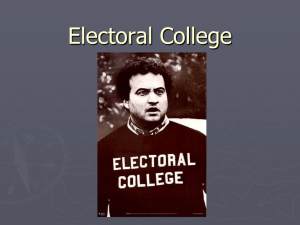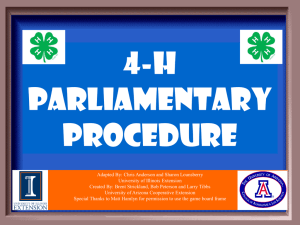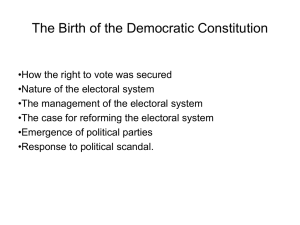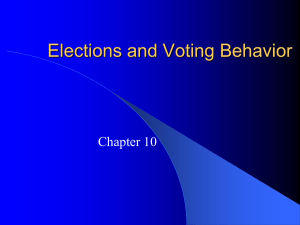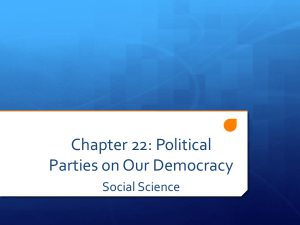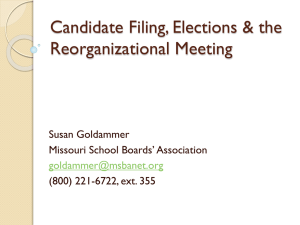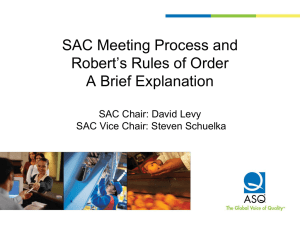Unit 4 Power Point
advertisement
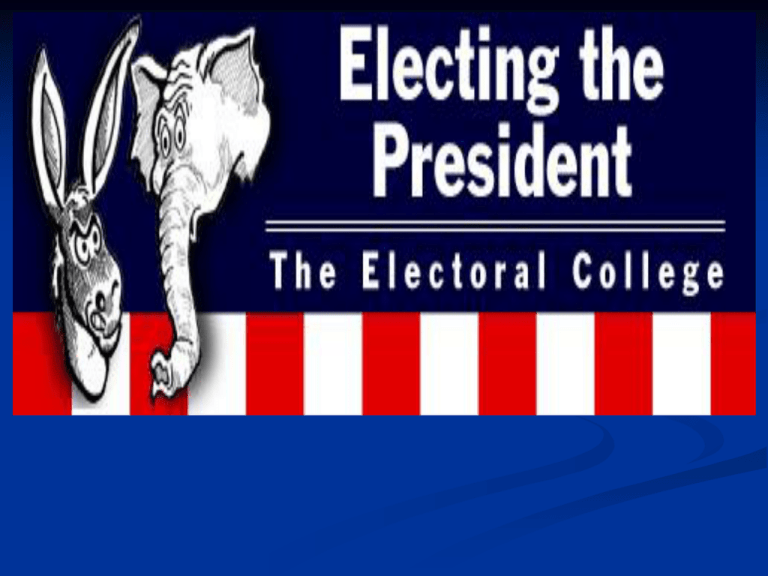
Explaining the electoral college video 2012 Popular vote Electoral vote November election Mid December Electors for Obama Electors cast their vote Ann, Bill and Chad (Bob, Steve, Mick) Romney Obama (Ann, Bill, Chad) Romney 2012 ballot How does the electoral college work? There are a total of 538 total electoral votes. Each state gets the same # of votes as they have members of Congress A majority of electoral votes are needed to be elected President. (270) If no majority of electoral votes are obtained the House of Representatives chooses the President The electoral college votes in mid December Monday following the second Wednesday in December, the electors of each state meet in their respective state capitals to officially cast their votes for president and vice president. These votes are then sealed and sent to the president of the Senate, who on January 6th opens and reads the votes in the presence of both houses of Congress. The winner is sworn into office at noon on January 20th. Why don’t we elect our president through popular vote? A safeguard against… Uneducated voters A protection against the people if the system of allowing people to vote on their leaders didn’t work out as hoped. Political Parties in the United States Political Party A group of people who share similar ideas Work to get its member elected into office Try to get government to work to promote their ideas. One party system Two party system Multi party system South Dakota political parties From Sect. of State; Updated October 1, 2014 46% Republican (239,355) 34% Democrat (175,186) 19% Independents (100,547) Libertarian (1,356) Constitution (595) American’s Elect (8) Total: 517,003 Recognized parties in South Dakota Political Parties in USA Gallup poll on party identification Current political parties in the US From politics1.com Minor Party Presidential Candidates 2012 Minor party candidates Election results What are “Minor Parties” or “Third Parties”? Currently a party that is not the Democratic or Republican parties They rarely win elected positions Impact of minor parties Take popular vote from candidates A third party DOES NOT take votes away equally from both parties 2000 Election More liberal candidates Al Gore Ralph Nader More conservative candidates George W. Bush Pat Buchanan Al Gore – (Democrat) Popular Vote: 50,992,335 Percentage - 48.38% George Bush – (Republican) Popular Vote: 50,455,156 Percentage: 47.87% Ralph Nader – (Green) Popular Vote: 2,882,897 Percentage: 2.74% Patrick Buchanan – (Reform) Popular Vote: 448,892 Percentage: 0.42 Florida 25 electoral votes Total Electoral Vote Bush 271 Gore 267 FLORIDA Bush, George W. Rep 2,912,790 48.85 Gore, Al Dem 2,912,253 48.84 Nader, Ralph Green 97,488 1.63 Buchanan, Pat Ref 17,484 0.29 Encourage major parties to face some important issues Ross Perot Impact of minor parties Take away electoral votes form major candidates Electoral votes for minor party candidates SOUTH DAKOTA Bush, George W. R 190,700 60.30 Gore, Al D 118,804 37.56 Buchanan, Pat REF 3,322 1.05 Phillips, Howard I 1,781 0.56 Browne, Harry LBT 1,662 0.52 PRESIDENTIAL ELECTION TIMELINE (2012) Primary Season and Caucuses Convention 2013 Candidate search begins Jan ‘2016 June Late summer General Election Nov. (1st Tues. after 1st Mon. in Nov.) Electoral College Vote Dec. (Monday after 2nd Wed. in Dec.) Inauguration Jan. –‘2017 Jan. 20 What is a Direct Primary Election? Explaining primaries video An Election in which a Political Party decides which candidate they will support. Closed Primary Open Primary What is a Caucus Similar to a primary except instead it is more like a large meeting instead of ballot voting 2012 Republican calendar Why not have multiple candidates from a party run for President? Republican Presidential Candidates 2012 Mitt Romney — Former Governor of Massachusetts Tim Pawlenty — Former Governor of Minnesota Dropped out of race August 14th Thaddeus McCotter — US House of representative from Michigan Dropped out September 22, 2011 Herman Cain — Former CEO of Godfather’s Pizza (dropped out December 4, 2011) Gary E. Johnson — Former Governor of New Mexico Dropped out Dec. 28 and decided to run as an independent Libertarian Michele Bachmann — United States Representative, Minnesota Dropped out January 4, 2012. Day after getting 5% in Iowa Caucus Jon Huntsman — Former Governor of Utah Dropped out January 16, 2012. Rick Perry — Governor of Texas Dropped out January 19, 2012 Rick Santorum — Former United States Senator, Pennsylvania Dropped out April 10, 2012 Newt Gingrich — Former House Speaker Dropped out April 25, 2012 Ron Paul — United States Representative, Texas Democratic Candidates 2008 US Senator Barack H. Obama, Jr. (Democrat - Illinois) . POLITICAL: Illinois State Senator, 1997-2005 (elected 1996, 1998, 2002). Candidate for Congress, 2000. US Senator, 2005 - present (elected 2004). Keynote Speaker, 2004 Democratic National Convention. US Senator Joseph R. "Joe" Biden Jr. (Democrat - Delaware) POLITICAL: New Castle County Councilman, 1970-72. US Senator, 1973 present (elected 1972; re-elected 1978, 1984, 1990, 1996, 2002). Candidate for President, 1988 (withdrew before first primary). US Senator Hillary Rodham Clinton (Democrat - New York) POLITICAL: First Lady of Arkansas, 1979-81 and 1983-93. First Lady of the US, 1993-2001. US Senator, 2001 - present (elected 2000, 2006). US Senator Christopher J. "Chris" Dodd (Democrat - Connecticut) POLITICAL: US Congressman, 1975-81 (elected 1974, 1976, 1978). US Senator, 1981 present (elected 1980, 1986, 1992, 1998, 2004). Former US Senator John R. Edwards (Democrat - North Carolina) POLITICAL: US Senator, 1999-2005 (elected 1998). Candidate for President, 2004 (lost in the primaries). Democratic nominee for Vice President, 2004. Former US Senator Maurice R. "Mike" Gravel (Democrat - Virginia) POLITICAL: Alaska State Representative, 1962-66 (elected 1962, 1964). Speaker of the Alaska House of Representatives, 1965-66. Candidate for US Congress, 1966. US Senator from Alaska, 196981 (elected 1968, 1974; unsuccessful candidate for renomination in 1980). Candidate for Vice President, 1972 Democratic Convention (226 delegates 3rd place - 7.5%). Founder & President, Democracy Foundation and National Initiative for Democracy non-profit groups. Congressman Dennis J. Kucinich (Democrat - Ohio) POLITICAL: Cleveland City Councilman, 1970-75 and 1983-85; Democratic nominee for Congress, 1972; Cleveland Clerk of Municipal Courts, 197577; Mayor of Cleveland, 1977-79 (elected in 1977; defeated for re-election in 1979); State Senator, 1995-97; US Congressman, 1997present (elected in 1996, re-elected in 1998, 2000, 2002, 2004, 2006). Candidate for President, 2004 Governor William B. "Bill" Richardson (Democrat - New Mexico) POLITICAL: Candidate for Congress, 1980. US Congressman, 1983-97 (elected 1982, 1984, 1986, 1988, 1990, 1992, 1994, 1996). US Ambassador to the United Nations, 199798. US Secretary of Energy, 1998-2001. Governor of New Mexico, 2003-present (elected 2002, 2006). Chairman, 2004 Democratic National Convention. Chairman, Democratic Governors Association, 2006. Nominated four times for the Nobel Peace Prize. PRESIDENTIAL ELECTION TIMELINE (2012) Primary Season and Caucuses Convention 2009 Candidate search begins Jan ‘2012 June Late summer General Election Nov. (1st Tues. after 1st Mon. in Nov.) Electoral College Vote Dec. (Monday after 2nd Wed. in Dec.) Inauguration Jan. –‘2013 Jan. 20 Recent Vice Presidents Gerald Ford Nelson Rockefeller Jimmy Carter Walter Mondale Ronald Reagan George H Bush George H Bush Dan Quayle William Clinton Albert Gore, Jr. George W Bush Richard Cheney Convention What is a Convention A big pep rally for the party for the upcoming election The two most important things accomplished at a convention is the write a platform and to nominate a candidate for President. Republican 2012: Tampa Florida the week of August 27th Democratic 2012: Charlotte, NC the week of September 3rd. What is a platform? What the political party believes on an assortment of important issues. Platform (Republican) Platform (Democratic) Nomination The party officially nominates their candidate for President When is the convention held? Every four years Late summer of the Presidential election year. TV and Other Ads 2012 Presidential Election 2012 commercial spending According to the Washington Post In the 2012 Presidential election, candidates had … 2 ads in Sioux Falls, SD costing $1,810 3 ads in Houston, TX costing $450 43,979 ads in Tampa, FL costing $48 million 55,613 ads in Denver, CO costing $55 million Why not equal spending in all states? Campaign commercials are GARBAGE and voters need to ignore them! Campaign Commercial Strategies Glittering Generalities Words and phrases that sound appealing and people can’t hardly disagree with. “South Dakota Values” Mitt Romney Card Stacking Use limited facts that support your position. Telling partial truths “Bad Call” Throw to the wolves Obama and Education Taliban Dan “Bad Call” Phone records show: Did make call to Fantasy Talk Service at 3:26 pm on January 28, 2004 The very next minute (3:27 pm) he made a second call to the exact same number except for the 3 digit area code was different The 2nd call was to the NY State dept of criminal justice. They were attending a meeting of the NY state district attorneys association Total cost of the call: $1.25 Throw us to the wolves 1st terrorist attack was 1993 when a truck bomb went off at the World Trade Center Kerry supported regular increases in intelligence spending several years prior to September 11, 2001 The cut Kerry proposed in 1996 was a 3% cut and came after it became known that the CIA had been hoarding $1 billion in unspent funds. It was defeated in the Senate. Porter Gross, who was Bush’s CIA director at the time of this commercial had also supported similar cuts in defense spending. Another Republican sponsored cut similar to Kerry’s actually became law. Just Plain Folk Give the impression that the candidate is just like the people. Statements, dress, Thune Thune commercials Sandlin Transfer Connect the candidate to a respected symbol or person Kerry Noem (grodet is sign in) R*******e) Negative Ads The goal is to get you to vote against a person. Scare the people out of voting for someone. Daisy Girl Willie Horton and Revolving Door Clinton Bandwagon Vote for candidate because other people like him or her. I Like Ike Real People Other Commercials Bear in the Woods NRA vs. Kerry Headlines Total Spending by Presidential Candidates* Total Spent in millions 2008 $1.6 billion 2004: $717.9 2000: $343.1 1996: $239.9 1992: $192.2 1988: $210.7 1984: $103.6 1980: $92.3 1976: $66.9 Money in Elections 1996 Clinton and Dole spent about $85 million each 2000 Bush spent $185 million 2004 Bush spent $367 million Kerry spent $326 million Nader spent $4.5 million 2008 Obama spent $730 million McCain spent $330 million 2012 Obama spent $985 million Romney spent $992 million How much do candidates spend per day as of October of 07? Newsweek, 10/29/07 Giuliani $112,101 Romney $196,382 McCain $104,894 Thompson $46,773 Clinton $148,501 Obama $161,792 Edwards $65,685 Today’s Candidates Money Raised for 2012 election Campaign Money Campaign Finance Laws Laws that regulate how much money can be given to political candidates and how that money can be used. Created by congress Campaign Finance Laws for 2014-16 election cycle 2008 Cycle4 Pre-BCRA To any candidate committee ( I n $2,600 d i v i d u a l c a n g i v e : To any national party committe e (per year) To any PAC, state/local party, or (per year) total Where do Candidates get their money Private Contributions Money given to a candidate from an individual, special interest, business, etc. Matching funds (also known as public contributions) Money the government matches Only small contributions ($250 or less) Must be eligible What are PAC’s? Political Action Committee PAC’s for the purpose of raising and spending money to elect and defeat candidates. Most represent interest groups such as business, labor or ideological interests. Super PAC’s PAC’s that are organized to help or hurt a specific candidate. They are supposed to be independent of the candidate’s campaign People and corporations can give an unlimited amount to a Super PAC New in 2012 Super PAC spending (Opensectrets.org) For Obama: $50 Million Anti Obama $333 Million Total $383 Million For Romney $90.5 Million Anti Romney $95 Million Total $185 Million Super PAC’s Daily and weekly spending by Super PAC Super PAC spending “Soft Money” Slang term for ways of getting around campaign finance laws. Federal Election Commission (FEC) In charge of enforcing campaign finance laws. All money given to a candidate must be reported to the FEC Congress makes the campaign laws but the FEC has to enforce them. Image and Public Opinion Opinion Polls Opinion polls A survey of the American people on a number of issues. CBS News/New York Times Poll. Sept. 12-15, 2014. N=854 registered voters nationwide. Margin of error ± 4. "Which ONE of the following issues will be MOST important in deciding your vote for Congress this November? Economy 38% Terrorism 17% Health Care 16% Budget Deficit 8% International Conflicts 6% Other 4% CBS News Poll. Sept. 28-Oct. 2, 2011. N=1,012 adults nationwide. Margin of error ±3. "What do you think is the most important problem facing this country today?" Economy and jobs 54 % Budget deficit/National debt 6% War/Iraq/Afghanistan 4% Partisan politics 3% Health care 2% Education 2% Politicians/Government 2% Religious values 2% Moral values/Family values 2% Concerns of the people may change over time and the amount of coverage an issue is getting. PollingReport.com Pollster 2012 Pollster.com (2008) Final Electoral count (2008) Who do you support for President? Republicans Democrats Exit Polling Exit polling 2008 Exit Polling 2012 Onion segment on voting groups (2:30 long) Onion attack ad Campaigns Slogans Campaigns Slogans 1988 George Bush Kinder, Gentler Nation 1992 Bill Clinton Don’t stop thinking about tomorrow 1992 Ross Perot Ross for Boss 1996 Bill Clinton Building a bridge to the 21st century 1996 Bob Dole The Better Man for a Better America 2000 Al Gore Prosperity for America's families 2000 George W. Bush Compassionate conservatism 2000 George W. Bush Real plans for real people 2000 George W. Bush Reformer with results 2000 Ralph Nader Government of, by, and for the people...not the monied interests 2004 John Kerry Let America be America Again 2004 George W. Bush Yes, America Can! 1864 Abraham Lincoln Don't swap horses in the middle of the stream 1884 Grover Cleveland Blaine, Blaine, James G. Blaine, The Continental Liar from the State of Maine 1884 James Blaine Ma, Ma, Where’s my Pa, Gone to the White House, Ha, Ha, Ha 1888 Benjamin Harrison Rejuvenated Republicanism 1896 William McKinley Patriotism, Protection, and Prosperity 1900 William McKinley A Full Dinner Pail 1916 Woodrow Wilson He kept us out of war 1920 Warren G. Harding Return to normalcy 1924 Calvin Coolidge Keep cool with Coolidge 1928 Herbert Hoover A chicken in every pot and a car in every garage 1952 Dwight Eisenhower I Like Ike Slogans and Bumper Stickers Posters Campaign posters Posters Candidate books Debates 2008 debate Democratic Primary Debate Why Register to Vote? So we don’t have voter fraud. This protects from people voting multiple times. Voter Turnout 2008 62% 2012 58% Voter turnout over time What are the problems with the Electoral College 1. Winner takes all. Whoever wins the state gets all of the electoral votes and the loser gets none. 48 states use this method. Two states (Nebraska and Maine) do not. 2. You can get the most popular vote and still lose the election Lets suppose we have two candidates Candidate A and Candidate B Popular Vote California A 15 mil B 14 mil Electoral Vote A 55 B 0 Popular Vote Electoral Vote A B A B California 15 mil 14 mil 55 0 Texas 2 mil 8 mil 0 38 Popular Vote Electoral Vote California A 15 mil B 14 mil A 55 B 0 Texas Georgia 2 mil 3 mil 8 mil 4 mil 0 0 38 16 Popular Vote California Texas Georgia Minnesota A 15 mil 2 mil 3 mil 3 mil B 14 mil 8 mil 4 mil 1 mil Electoral Vote A 55 0 0 10 B 0 38 16 0 Popular Vote Electoral Vote A B A B California 15 mil 14 mil 55 0 Texas 2 mil 8 mil 0 38 Georgia 3 mil 4 mil 0 16 Minnesota 3 mil 1 mil 10 0 Total 23 mil 27 mil 65 54 2. You can get the most popular vote and still lose the election 2000 Presidential Popular Vote Al Gore – (Democrat) Popular Vote: 50,992,335 Percentage - 48.38% George Bush – (Republican) Popular Vote: 50,455,156 Percentage: 47.87% The three other times 1876 Hayes won over Tilden even though Tilden received 254,432 more popular votes 1888 B. Harrison won over Cleveland even though Cleveland 90,596 more popular votes 1824 John Quincy Adams received 38,000 fewer votes than Andrew Jackson but the HR chose Adams 3. House decides if no majority is reached This has been used twice in American History Thomas Jefferson and Aaron Burr tied and the HR chose Jefferson to be the third President In 1824 John Quincy Adams, Andrew Jackson and William Crawford all ran and a majority wasn’t reached The HR chose Adams even though Jackson probably received the most popular votes. 4. Vote only counts in your state. South Dakota 5. Electors can vote opposite of the voters wishes 24 states do not require electors to cast their votes the same as the people voted Only happened 11 times since 1796 6. Small states have a disproportionate amount of votes than they should. California 55 electoral votes Population: 38,000,000 Ratio 55:38,000,000 Ratio: 1 electoral vote for every 690,909 people South Dakota 3 electoral votes Population: 750,000 Ratio: 3:750,000 Ratio: 1 electoral vote for every 250,000 people To be fair, California should have 152 electoral votes to our 3 7. Outdated Explaining the electoral college video Problems with electoral college video 2012 Because the Electoral College is in the Constitution it would take a Constitutional Amendment in order to change the Electoral College. Amending the Constitution 1. 2. Two ways to propose. Pass Congress with 2/3rds vote Call for Constitutional convention by 2/3rds of states 1. 2. Two ways to ratify Pass 3/4ths of state legislatures 3/4ths states in National Convention The Executive Branch Term of Office 22nd Amendment passed in 1951 Allowed two terms of office Each term of office is 4 years Can serve a total of 10 years. Presidential Qualifications Natural Born Citizen 2. At least 35 years old 14 Year resident of the USA 1. 3. Salary and Benefits $400,000 per year non taxable travel up to $100,000/year Air Force One, protections, White House and all operational expenses Retired Presidents get $148,000 per year plus free mailing, free office space and $96,000 for office help Powers of the Vice President 1. Preside over the senate and break tie. 242 (Chaney has done is 6 times Biden 0) 2. Help decide if Pres is able to perform duties (25th Amend) Make $175,000 per year Powers of the President 1. Commander in Chief of the Armed Forces Presidents Cabinet Cabinet 1. Pardons and Reprieves Only for federal crimes Why? Presidential pardons list Examples of Pardons Every Confederate Soldier: On Christmas Day 1868, President Andrew Johnson declared a general amnesty that unconditionally pardoned everyone who'd fought for the Confederacy during the Civil War. Nixon by Ford Vietnam draft dodgers by Carter 3. Treaties and Appointments Treaties must be approved by the Senate with a 2/3rds vote Appointments must be approved by the Senate with a majority vote 4. Veto 96% are NOT overridden Presidential Vetoes 5. Fill Vacancies for Temporary Time 6. Call Special Sessions of Congress Checks and Balances Players Coach Referee President can Appoint federal judges Who can Check? Legislative Branch How can it be checked Senate confirms appointments with a majority vote President can make treaties Who can Check? Legislative Branch How can it be checked Senate ratify treaties with a 2/3rds vote President is commander in chief of the military Who can Check? Legislative Branch How can it be checked Congress has the following powers Declare war $ for military Create army and navy Draft Call up national guard President can veto bills Who can Check? Legislative Branch How can it be checked Congress can override veto with 2/3rds vote President can issue pardons and reprieves Who can Check? Nobody Who is it a check of ? Judicial Branch Congress can make laws Who can Check? President How is it checked? Veto or sign the bill Supreme Court can also declare the law unconstitutional Congress can Declare War Who can Check? President How is it checked? President is the commander in chief of the military and can choose not to carry out the war. Congress can Impeach Who can Check? Nobody Only for treason, bribery, high crimes and misdemeanors Who is it a check of ? Executive and Judicial branches Judicial Review: The power of the SC to declare laws and actions unconstitutional Who can Check? Nobody But the Supreme court justices get their jobs through the President and the Senate Who is it a check of ? Legislative and Executive Branch Checks and Balances spreadsheet President (executive) Congress (Legislative) Veto Make Laws Commander in Chief Appoint judges and others Make Treaties Military powers Confirm appointments Ratify treaties Pardons Impeachment Supreme Court (Judicial) Judicial Review
